Meet chef Yannick Alleno and his new sauce extractions pairing
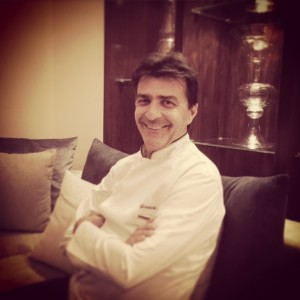 A so-called ‘food and extractions pairing menu’ that chef Yannick Alleno has just launched in his Dubai restaurant, Stay at the One & Only Palm left me confused but intrigued. Wine extractions? No. Simply described it’s all about deconstructing sauces as a beverage and pairing them with dishes. So no vino for this particular meal.
A so-called ‘food and extractions pairing menu’ that chef Yannick Alleno has just launched in his Dubai restaurant, Stay at the One & Only Palm left me confused but intrigued. Wine extractions? No. Simply described it’s all about deconstructing sauces as a beverage and pairing them with dishes. So no vino for this particular meal.
With 16 restaurants in France, Morocco, China, Taiwan and the UAE, Yannick left his three Michelin star restaurant Le Meurice in 2013 after a decade-long stint to take some time out before moving to Pavillon Ledoyen – Alleno Paris in 2014. Under his helm, seven months later, it earned three stars. A frequent visitor to his Dubai restaurant (his contract covers all the hotel’s F&B, room service included), he was back in town last week to introduce the new food and extractions pairing menu, a permanent fixture. He explains his new discovery to FooDiva here in this interview, whilst also expressing his distaste for globalisation and all things fusion.
- You call yourself a hotel chef – how does this role differ to a restaurant chef? You have to take care of more things. I think you are more powerful. The real definition of luxury for me is ‘I need it, I’ve got it’. In contrast to a restaurant, in a hotel you can have the things you want every time you want it; and the real definition of luxe is really that. That’s why I love hotels.
- So would you call yourself a hotelier then, rather than a restaurateur? No. I think I am a restaurateur – but in a hotel. Good answer. It’s a political answer [he laughs].
- Why did you leave Le Meurice in 2013? I stayed there for ten years, and I left to do something else. I learned a lot; but it was time for me to go out into the competition so I could reflect, and I tried to think about the future of my cuisine. I searched and I found a new basis for my cuisine. The main thing in French cuisine is the sauces, and since les moyens ages [Middle Ages] we haven’t thought about new ways of making our sauces.
- Looking at human evolution, the first thing was fermentation; we can eat animal protein because of fermentation, and because of that the brain started to develop. And then we developed to understand fire. Every single animal when it sees fire starts to run – except humans – because the brain has developed. Before fermentation, humans were vegetarian. The more humans controlled the fire, the more they could eat animal protein, and the more the brain grew. And so humans started to stay where they loved to live; they stopped to roam everywhere, and agriculture began; they started to speak; and I think in that moment gastronomy was born. They stayed in one place instead of roaming everywhere, and they thought about their food, and how they could make it better. And since that time we have seen the fantastic evolution of gastronomy. Sauces are so developed.
- I also went to Cognac because I had more time on my hands, so I went to speak with Monsieur Fillioux. I went to distillation in the morning and Monsieur Fillioux is 70-something, and around the table there were nine people, and two people aren’t expected to speak for ten years; they just have to learn. And they taste like that, and say, ‘OK this one we save, this one we don’t save.’ And we had lunch, and I asked him what he was doing, and he said ‘I am doing Cognac. Since 1780, since the beginning of Hennessey, the liquor has had the same taste.’ And I said ‘my goodness, my sauces are not very regular’; and he told me I had to do it by blending. So I understood that I had to deconstruct things to control them perfectly, and to blend them after that.
- Since les moyens ages, we have done sauces the same way. We take a pot; we put elements in together; we boil it for a long time; when the taste is in the liquid we do a filtration; we cook it down; and we have a concentration of the taste. So I cooked the different elements one by one at the right temperature and for the right amount of time. I never cook above 88C, because past that you have a huge destruction of taste. And we did that for all our sauces.
- So you must be using techniques like sous-vide? Yes, that too. But sous-vide is not the main thing; you can do it without sous-vide. The main problem is the temperature. If you cook past 88C, you kill the minerality; it’s very destructive. So I stay below that temperature. But I have to concentrate it, and that’s why you have to remove water, so I choose the frozen way, like you do with ice wine, to get real concentration. The first step is extraction. I cook it sous-vide at the right temperature to the right moment. This is the base. I then do filtration, but instead of heating, I do the opposite, the frozen way (like ice wine). And I stop before the destruction of flavour.
- This must be part of your new ‘food and extractions pairing’ as you call it? When I do an extraction, I taste that, and I ask why we don’t use that to make a pairing for Arabs; for people that don’t like to drink alcohol. Because they’re usually eating with 7-Up and Coca Cola. Even vinegar often comes through an alcoholic and acidic fermentation. When you think about it, we don’t really take care of the Arabs and locals here. So when you have a dish, you play with the extraction, and you say ‘this is the perfect match between extraction and my plate’. Now for the first time we can explain to those who don’t drink that you can also have a fantastic gastronomic experience.
- Across all of your restaurants, what percentage of your diners are Arabs? I don’t think I have enough, because I haven’t tailored my menus in the past for them. But I think we can have a fantastic development of food and techniques, so that if you’re a Muslim customer you can come in and think ‘for the first time they’re thinking about our pairings; it’s completely new’. And in the future I think we’ll have more. Even in Morocco, where I work in Marrakech, I can propose to Muslim customers something fun for them. So here in Dubai we will now have for instance an individual drink pairing of artichokes, mushrooms, beetroot, pumpkin…and more.
- Given sauces are so important to you as a Frenchman, what if from your traditional menu a diner asks for the sauce to placed on the side? What do you say? I have to put it on the plate. We put sauces on the side because they are creamy, fatty, beurrey – that’s why people love sauces. With our sauces there is no fat, no salt, it’s just extraction; pure taste. Sauces are very noble, but I think the sauces of the past, they’re like a monument, or like Picasso – you can’t touch it. You have to preserve them like they are. It’s so amazing when you understand sauces. In France we used to say that you are born a rotisser – you know how to roast – but you become a saucier. It’s a long, long process to understand sauces. With many French sauces the base was French, but they absorbed outside influences – like with a la espagnol. That’s what makes French cuisine so unique. And when we lose sauces, we start to make food like other places in the world, and I have to refuse globalisation. When you come to France, it’s to have a very specific food of France, and not the food you can have somewhere else. I think we lose something when we feel more strongly the foreign influence; the yuzu, the soy sauce, things like that.
- So you don’t believe in fusion cuisine? I think fusion can be confusion. I can’t critique things, but even when we work with Moroccan food, we really try to understand Morocco before attempting fusion. Because the food of Morocco, we have worked on it for eight years, and now the King has asked me to give to the people a cuisine with the right identity. I think we really have to go back in that direction. I remember as a kid being really excited when I went to England because you can buy things you can’t buy in France. Now you can have the same things everywhere; the same bag, the same watch, anything. So I think we lose a certain part of the pleasure. So if you take a plane and come to my restaurant, you will be really excited because you can’t have that type of food anywhere else. That, I think, is very important.
- There are rumours that by Expo 2020 Michelin will start rating Dubai. In 2012 I asked you whether Dubai is ready for Michelin rating? Here is what you said – does this still stand?
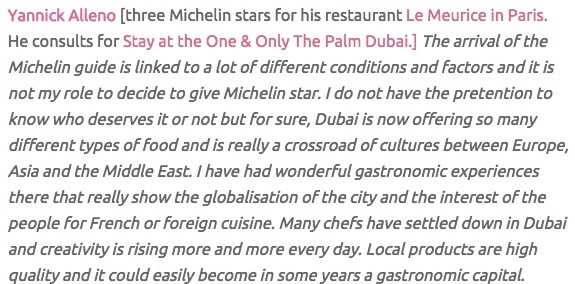
I think yes. People are increasingly looking for that type of thing. So I will give you the same answer. Dubai is really becoming the hub of the world. I don’t know if Abu Dhabi is mature enough – but I think by 2020 Dubai will definitely be ready.
- You talk about local produce. What local ingredients do you source here? Of course, it’s very hard here. But looking to the future, we know that we have to take care of the planet. And I have trust in human’s intelligence, and a start has been made on a new process of agriculture; to think global we have to think local. So things are not really ready yet locally, but let’s talk about it in ten years. I think we will see more farms here, and we can then use more local food.
- But there are hundreds of farms here in the UAE, and yes the summer months are an issue as are consistency and scale, but do you not source anything locally even for Zest or room service? We buy some things here. Mozzarella, for example.
- Any new restaurant openings planned? We have plans for Ledoyen. To take it global? Yes.
- Your favourite restaurant in Dubai – and one globally. It’s very tough to say what I prefer in Dubai…there is so much quality. I know Zuma, La Petite Maison, Jason Atherton’s Social. Jason is a good friend, and he’s quite good. Anyway it’s very tough to say which is my favourite. What I love in restaurants is the diversity. Last year I had a fantastic surprise. I went to the US, and had a fantastic dinner with Justin Cogley at his restaurant Aubergine. It’s very, very, local cuisine. Catch from the sea; everything on the plate. I think it’s something normal, but in the modern way it’s not so normal. I think cuisine is going through a fantastic evolution. That’s why in France we have to make an evolution, and the sauces are really new. And it makes me really happy to see a lot of chefs coming to Paris to taste my work.
Even though the pairings I tried married well, for that haute level of cuisine, I would much prefer vino. How about you? Do you agree that fusion is confusion, or do you think it encourages creativity?
A bientôt.
FooDiva. x
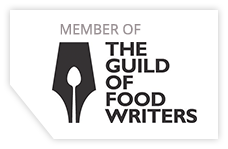















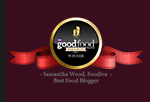
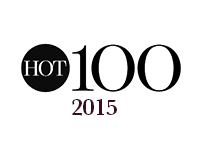







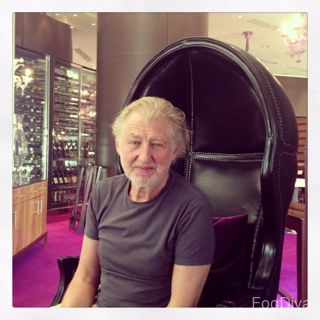
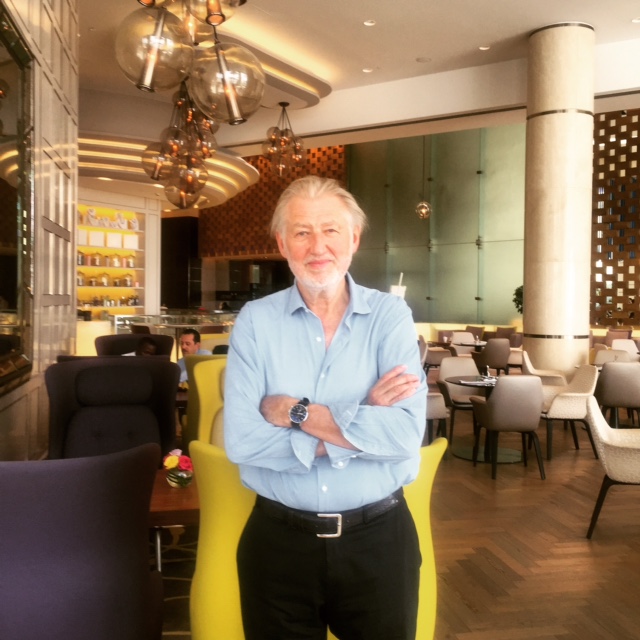
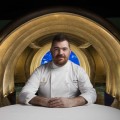



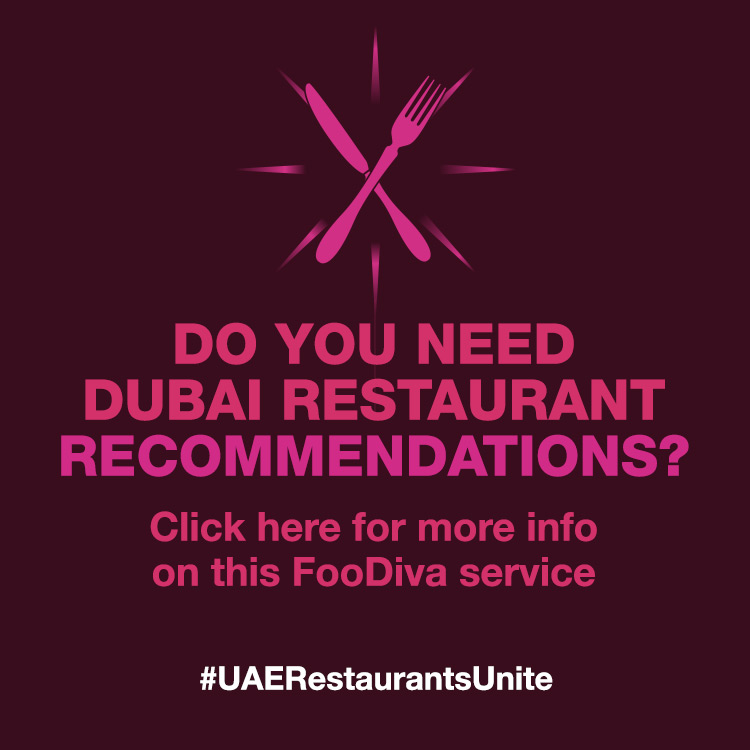


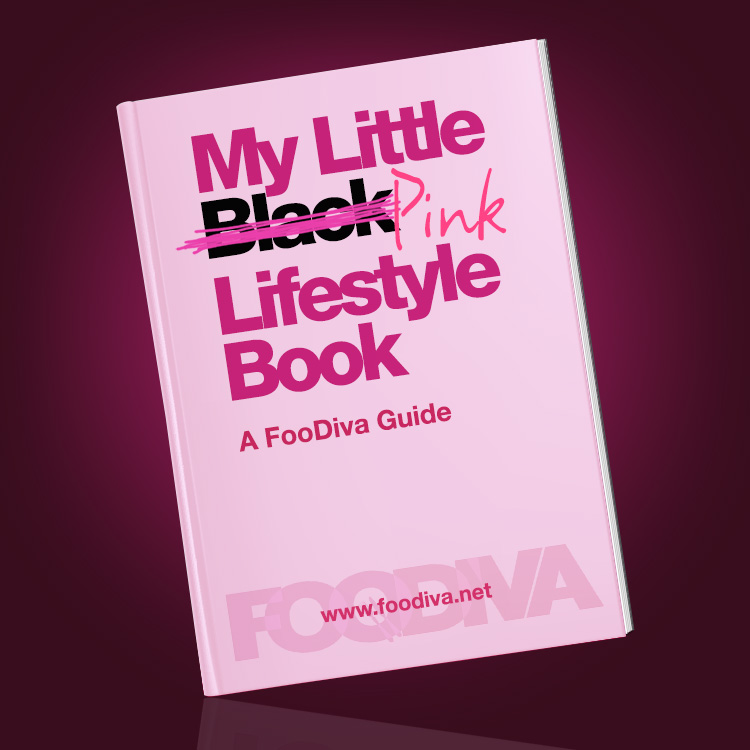



Well done – an extremely ‘eye opening’ interview – so I have to find time to go and try out the concept. Thanks for this.
Thanks Garry. I think if I was to return I would like the sauce AND wine pairing!
Yes, to me ‘fusion is confusion’. Fusion these days is probably becoming a marketing tool.
Regarding sauces, I used to enjoy my sauces, the French way. Nowadays with my healthy eating,
I avoid sauces and ask for them to be served separately,…..
I think Yannick would insist his sauces are light and healthy Kelly 🙂